

Being Defensive. Life is short. Death. Maslow's hierarchy of needs. Maslow's hierarchy of needs, represented as a pyramid with the more basic needs at the bottom[1] Maslow's hierarchy of needs is a theory in psychology proposed by Abraham Maslow in his 1943 paper "A Theory of Human Motivation" in Psychological Review.[2] Maslow subsequently extended the idea to include his observations of humans' innate curiosity.
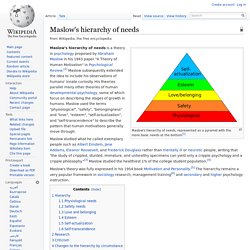
His theories parallel many other theories of human developmental psychology, some of which focus on describing the stages of growth in humans. Maslow used the terms "physiological", "safety", "belongingness" and "love", "esteem", "self-actualization", and "self-transcendence" to describe the pattern that human motivations generally move through. Maslow's theory was fully expressed in his 1954 book Motivation and Personality.[5] The hierarchy remains a very popular framework in sociology research, management training[6] and secondary and higher psychology instruction. Hierarchy Physiological needs Safety needs Safety and Security needs include: Joseph Campbell. Joseph John Campbell (March 26, 1904 – October 30, 1987) was an American mythologist, writer and lecturer, best known for his work in comparative mythology and comparative religion.
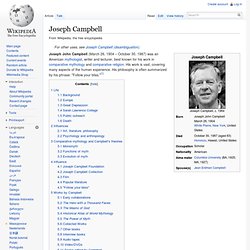
His work is vast, covering many aspects of the human experience. His philosophy is often summarized by his phrase: "Follow your bliss. "[1] Life[edit] Background[edit] Joseph Campbell was born and raised in White Plains, New York[2] in an upper-middle-class Irish Catholic family. What makes a hero? - Matthew Winkler. The Hero Archetype in Literature, Religion, and Popular Culture: (along with a useful PowerPoint presentation teachers can download at this URL: )Maricopa Center for Learning and Instruction (users embark on their own hero's journey): American Masters Lesson from PBS for Teachers on George Lucas, the Power of Myth, and the Hero's Journey: an interactive approach to the Hero's Journey: of course, information about Joseph Campbell's works on the subject, on the Joseph Campbell Foundation site:The Hero With A Thousand Faces Hero's Journey (semi-biographical film): the stories of (a) Odin hanging from the world tree, Yggdrasil, (b) the Buddha seated under the Bodhi Tree, and (c) the crucifixion of Jesus Christ.
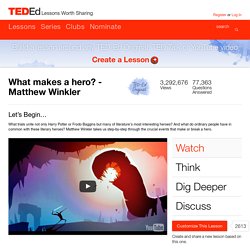
Human body. The Star In You. By Peter Tyson Posted 12.02.10 NOVA scienceNOW "Our planet, our society, and we ourselves are built of star stuff.

"—Carl Sagan, Cosmos. Scale of Universe - Interactive Scale of the Universe Tool. The Most Astounding Fact - Neil deGrasse Tyson. Profile on TED.com.
Human Anatomy and Conditions in Interactive 3D. 100 Very Cool Facts About The Human Body – Global One TV: Multimedia for Mystics. The Brain.
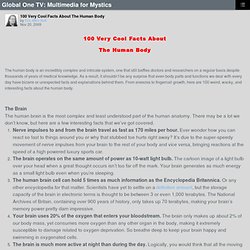
Human Genome Project Information. Genetics Overview - Science Behind the Genographic Project - National Geographic. The Human Body The human body is made of some 50 trillion to 100 trillion cells, which form the basic units of life and combine to form more complex tissues and organs.

Inside each cell, genes make up a “blueprint” for protein production that determines how the cell will function. Genes also determine physical characteristics or traits. The complete set of some 20,000 to 25,000 genes is called the genome.
Psychology Tests & Surveys. Determinism. Determinism is the philosophical position that for every event, including human action, there exist conditions that could cause no other event.

Free will. Though it is a commonly held intuition that we have free will,[3] it has been widely debated throughout history not only whether that is true, but even how to define the concept of free will.[4] How exactly must the will be free, what exactly must the will be free from, in order for us to have free will?
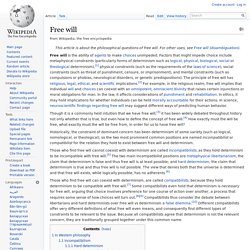
Historically, the constraint of dominant concern has been determinism of some variety (such as logical, nomological, or theological), so the two most prominent common positions are named incompatibilist or compatibilist for the relation they hold to exist between free will and determinism. In Western philosophy[edit] Viktor Frankl. Viktor Emil Frankl, M.D., Ph.D. (26 March 1905 – 2 September 1997)[1][2] was an Austrian neurologist and psychiatrist as well as a Holocaust survivor.
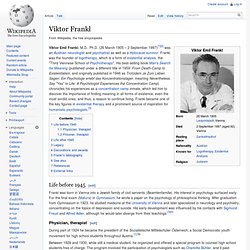
Frankl was the founder of logotherapy, which is a form of existential analysis, the "Third Viennese School of Psychotherapy". His best-selling book Man's Search for Meaning (published under a different title in 1959: From Death-Camp to Existentialism, and originally published in 1946 as Trotzdem Ja Zum Leben Sagen: Ein Psychologe erlebt das Konzentrationslager, meaning Nevertheless, Say "Yes" to Life: A Psychologist Experiences the Concentration Camp) chronicles his experiences as a concentration camp inmate, which led him to discover the importance of finding meaning in all forms of existence, even the most sordid ones, and thus, a reason to continue living.
Frankl became one of the key figures in existential therapy and a prominent source of inspiration for humanistic psychologists.[3] Life before 1945[edit] Individualism. Individualism makes the individual its focus[1] and so starts "with the fundamental premise that the human individual is of primary importance in the struggle for liberation.
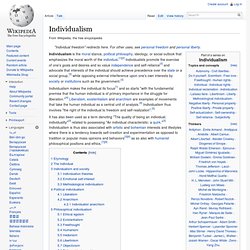
"[4] Liberalism, existentialism and anarchism are examples of movements that take the human individual as a central unit of analysis.[4] Individualism thus involves "the right of the individual to freedom and self-realization".[5] Myth of self. Extreme individualism rebels against nature’s design of the human being. People suffer extreme mental agony "merely" by being kept alone.
The Myth of Individualism. Peter Callero. The Unicist Research Institute. Why Not Apologizing Makes You Feel Better. Illustration by NPR To err is human. So is refusing to apologize for those errors. From toddlers and talk show hosts to preteens and presidents, we all know people who have done stupid, silly and evil things, then squared their jaws and told the world they've done nothing wrong. Parents, educators and even public relations flacks have talked at length about the value of coming clean, and there is abundant research on the psychological value of apologizing.
But psychologists recently decided to take a new tack: If so many people don't like to do it, there must be psychological value in not apologizing, too. In a recent paper, researchers Tyler G. "We do find that apologies do make apologizers feel better, but the interesting thing is that refusals to apologize also make people feel better and, in fact, in some cases it makes them feel better than an apology would have," Okimoto said in an interview.
"When you refuse to apologize, it actually makes you feel more empowered," he said. Sigmund Freud Biography. Profile on TED.com. Self Comes to Mind: Constructing the Conscious Brain: Antonio Damasio: 9780307474957: Amazon.com. Self Comes to Mind: Constructing the Conscious Brain - Antonio Damasio. Medicine. Medicine (also called conventional, orthodox, scientific, or mainstream medicine, especially in connection with alternative medicine, UK English i/ˈmɛdsɨn/, US English The word medicine is derived from the Latin ars medicina, meaning the art of healing.[3][4] Clinical practice[edit] The components of the medical interview[5] and encounter are: The clinical examination involves the study of: It is to likely focus on areas of interest highlighted in the medical history and may not include everything listed above. Medical laboratory and imaging studies results may be obtained, if necessary. Culture. Culture (Latin: cultura, lit. "cultivation"[1]) is a modern concept based on a term first used in classical antiquity by the Roman orator Cicero: "cultura animi" (cultivation of the soul).
This non-agricultural use of the term "culture" re-appeared in modern Europe in the 17th century referring to the betterment or refinement of individuals, especially through education. During the 18th and 19th century it came to refer more frequently to the common reference points of whole peoples, and discussion of the term was often connected to national aspirations or ideals. Some scientists such as Edward Tylor used the term "culture" to refer to a universal human capacity. In the 20th century, "culture" emerged as a central concept in anthropology, encompassing the range of human phenomena that cannot be directly attributed to genetic inheritance.
Etymology[edit] As described by Velkley:[6] Change[edit] Society. A society , or a human society , is a group of people related to each other through persistent relations, or a large social grouping sharing the same geographical or virtual territory, subject to the same political authority and dominant cultural expectations. Human societies are characterized by patterns of relationships ( social relations ) between individuals who share a distinctive culture and institutions ; a given society may be described as the sum total of such relationships among its constituent members.
In the social sciences , a larger society often evinces stratification and/or dominance patterns in subgroups. Insofar as it is collaborative , a society can enable its members to benefit in ways that would not otherwise be possible on an individual basis; both individual and social (common) benefits can thus be distinguished, or in many cases found to overlap. [ edit ] Etymology and usage [ edit ] Conceptions of society. How to Win Friends & Influence People: Dale Carnegie: 9780671723651: Amazon.com.
How to Win Friends & Influence People. Curiosity. Curious children gather around photographer Toni Frissell, looking at her camera.
Core self. Proto self.